Cross Curricular / Links with Other Subjects
Useful articles in 'Primary History'
|
Each section of this unit begins by highlighting articles based on the current National Curriculum, and is followed by earlier pieces that are still worth reading. Please note that while the core advice is still relevant, articles from editions published prior to Primary History 66 will be based on the old National Curriculum. |
1. Literacy/English
2. Mathematics/Numeracy
3. Art, Music, PE
4. Citizenship/PHSE/Values
5. Creativity
6. Geography
7. Global Education/Environmental/Built Environment
8. Science
9. Design Technology
10. Cross curricular themes/planning
1. Literacy/English
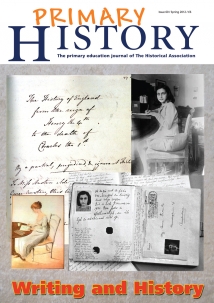
- Hilary Robinson, “Writing books for young children about the First World War” PH 79, summer 2018.
Also:
- Nuffield Primary History Project, “History and language” PH 64, summer 2013
- Nuffield Primary History Project, “History and language” PH 60, spring 2012.
- Nuffield Primary History Project, “Oracy and writing: speaking, listening, discussion and debate” PH 60, spring 2012. Case study on Grace Darling and the Victorian workhouse.
- Nuffield Primary History Project, “Reading into writing” PH 60, spring 2012. Case study of Saxon poetry.
- Nuffield Primary History Project, “Mini scaffolds: charts, concept webs, diagrams, mini-frames, grids and tables” PH 60, spring 2012. Includes case study of Florence Nightingale.
- Nuffield Primary History Project, “Poetic writing” PH 60, spring 2012. Includes case study of Saxon poem.
- Nuffield Primary History Project, “Historical accounts: Reports and recounts” PH 60, spring 2012. Case study of evacuees and Fulwell windmill.
- Nuffield Primary History Project, “Writing: demonstration and modelling” PH 60, spring 2012. Case study of Archimedes and Syracuse.
- Nuffield Primary History Project, “Writing generator” PH 60, spring 2012. Covers different modes, audiences. Case study on the body in the bog.
- Nuffield Primary History Project, “Children writing history: the writing spectrum – from historical accounts to poetic writing and historical fiction” PH 60, spring 2012. Includes case study on Scott and Amundsen.
- Nuffield Primary History Project, “Writing and History Overview” PH 60, spring 2012. Includes case study of evacuees.
- Sarah Codrington, “Children writing history: Nuffield Primary History Project Exemplar lessons” PH 60, spring 2012.
- John Fines, “Children writing history” PH 60, spring 2012.
- Pat Hoodless, “Planning links with Literacy” PH 57, spring 2011
- Jon Nichol, “Difficult and Challenging Reading: Genre, Text and Multi-Modal Sources – Textbreaker” PH 56, autumn 2010.
- David Wray and Maureen Lewis, “Bringing Literacy and History Closer Together”, PH 20, October 1998. Largely based on Exeter Extending Literacy Initiative.
2. Mathematics/Numeracy
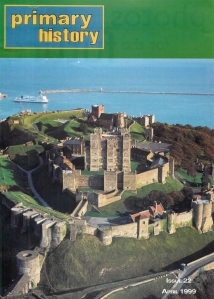
Also:
- Colin Miller, “The Magic of Mathematics”. PH 22, April 1999. Linking history and maths
- Colin Miller, “Mathematics from History”, PH 21, January 1999. Linking history and maths.
- Colin Miller, “Pythagoras and Number” PH 20, October 1998.
3. Art, Music, PE:
Also:
- Justine Reilly and Brian Heywood, “Celebrate your sporting heritage on National Sporting Heritage Day” PH 74, autumn 2016
- Natalie Gomez, “Inspiring artwork: using the paintings in the Kenwood Collection to develop creative writing skills nd introduce children to a historic house” PH 61, summer 2012.
- Alison Webb, “Music and History combine at Key Stage 2”, PH 53, autumn 2009.
- Sue Temple, “Justifying the Links: Art and History”, PH 49, summer 2008.
- Hilary Cooper, “What are the reasons for linking Art and History?” PH 49, summer 2008.
- Rosie Turner Bisset, “Music in the History Curriculum”, (In my View), PH 44, autumn 2006.
4. Citizenship/PHSE/Values:
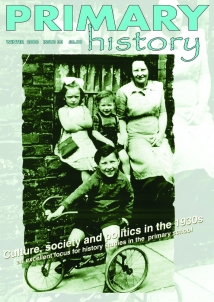
- David Carr, ‘Exploring the story of elections and voting with your primary students’, PH 97, summer 2024.
- Bee Rowlatt and Kirsty Ruthven, ‘Significant people: Why it's worth considering Mary Wollstonecraft’, PH 94, summer 2023
Also:
- Mike Mitchell, “Citizenship and the Olympics” PH 58, summer 2011
- Hilary Cooper, “History, values education and PHSE” (In My View), PH 50, autumn 2008.
- Hilary Claire, “Learning and Teaching about Citizenship through History in the Primary Years”, PH Leading Primary History: Support Materials for History Co-ordinators”, 2005. Very useful, detailed and comprehensive.
- Peter Vass, “Stories about People: Narrative, Imagined Biography and Citizenship in the Key Stage 2 Curriculum”, PH 41, autumn 2005.
- Anthony Panter and Ian Cawood, “Identifying the Potential of History in Teaching Citizenship at KS1 and 2”, PH 33, winter 2002.
5. Creativity
- Kerry Somers, Paul Sowden, Bronte Bailey, Kelly Sweetnam and Cheryl Burton, ‘Creativity in history’ PH 97, summer 2024.
Also:
- Hilary Cooper, “Creativity and History” PH 63, spring 2013
- Barbara Sands, “Lesson Planning Recipe: The Creative Curriculum – the Classroom Teachers Perspective” PH 57, spring 2011.
6. Geography
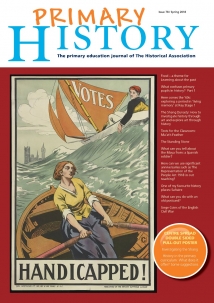
- “Linking historical events with geography” Ideas for Assembly. PH 78, spring 2018
- Alf Wilkinson and Ben Ballin, “When 2+2=5! Teaching history and geography together in a meaningful way” PH 73, summer 2016. Covers Egypt and Maya
Also:
- Hilary Cooper, “Planning or Historical, Geographical and Social Understanding. A Conceptual Framework. Responding to the Rose Report through the Lens of the Cambridge Review” PH 53, autumn 2009.
- Alan Blyth, Ray Dorricott, Gordon Elliott, Hazel Sumner, Allan Waplington, “Planning for Historical, Geographical and Social Understanding: Place, Time and Society”, PH 53, autumn 2009.
- Denise Howe and Hilary Pegum, “Pride in Place: An Answer to the Question: What does Historical, Geographical and Social Understanding look like?” PH 53, autumn 2009
- Rachel Bowles, “History and Geography are fundamental in the primary curriculum” PH 50, autumn 2008. The way they complement each other..
7. Global Learning/Environmental/Built Environment
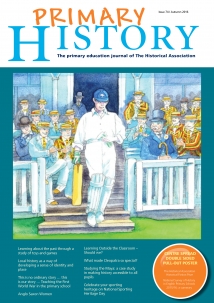
- Catriona Ni Cassaithe and Anne Marie Kavanagh, ‘Using Indigenous and traditional stories to teach for climate and ecological action’, PH 96, spring 2024.
- Karin Doull, ‘Linking history and science: how climate affected settlement’, PH 96, spring 2024.
- Ailsa Fidler, ‘Earth heroes: Etta Lemon, the Mother of Birds’, PH 96, spring 2024
- Ailsa Fidler (collated), ‘Trees’, PH 96, spring 2024
- Lucy Hawker, ‘Exploring sustainability in the Early Years’, PH 96, spring 2024.
- Alison Kitson and Michael Riley, ‘The potential of primary history’ PH 96, spring 2024.
- Tim Lomas, ‘How much has the weather mattered in British history? A possible development study’, PH 96, spring 2024
- Michael Riley, ‘Why we need to teach about the history of trees and woodland (and how we might do it)’, PH 96, spring 2024.
- Paul Spear, ‘Dig for Sustainability!’ PH 96, spring 2024
- Sue Temple, ‘A Significant Local Event: Carlisle floods’, PH 96, spring 2024
- Susie Townsend, ‘The year without a summer and other cautionary tales’, PH 96, spring 2024.
- Christopher Russell, “Learning outside the classroom – should we? “ PH 74, autumn 2016
- Joyce Hallam, “History supporting global learning” PH 72, spring 2016. Linked to Global Learning Programme.
- Tina Roberts, “TREE-mendous history! How Forest School and Nature Play can develop the learning of history” PH 70, summer 2015.
Also:
- Dominic Balmforth, “Learning what a place does and what we do for it”, PH 52, summer 2009. Use of architecture and the built environment.
- Simon Wooden, “Building learning places – and learning about places and buildings” PH 52, summer 2009.
- Rick Weights, “Planning for History and Environmental Education: The Head Teacher’s Perspective”, PH 52, summer 2009.
- Jacquie Dean, “Nuffield Urban Spaces Project”, PH 52, summer 2009. Role of history.
- Linda la Valle, Mary Olszewska and Dave Gurnett, “On Track: Using the West Somerset Mineral Railway to promote Historical, Social and Environmental Education”. PH 52, summer 2009.
- Tim Lomas, “Planning for history and environmental education” (Co-ordinators dilemma) PH 52, summer 2009.
8. Science
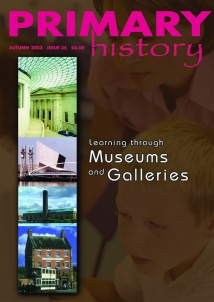
Also:
- Anthony Richards, “Identity Crisis: History through Science, strange bedfellows or obvious partners?”, PH35, autumn 2003. Largely based on the Science Museum in London.
9. Design and Technology
- Gordon Guest, “Developing Design and Technology through History”, PH 17, November 1997.
10. Cross-Curricular Themes/Planning
- Matthew Sossick, “Epistemic insights: bringing subject disciples together to help children answer big questions” PH 84, spring 2020
Also:
- Pat Hoodless, “An Olympic Timeline” PH autumn 2013.
- Hilary Cooper, “Planning for historical, geographical and social understanding: a conceptual framework” PH 64, summer 2013
- Jane Card, “An Olympic Great? Dorando Pietri” PH 58, summer 2011. Includes the Olympic Ideal
- Beverley Forrest, “From Champion to Hero: Engaging pupils in a study of significant Olympians” PH 58, summer 2011.
- Jane Carter, “The Passing of Harry Patch: An integrated literacy and history unit of work” PH 56, autumn 2010. Based on World War 1.
- Chris Rowley, “Cross-curricular learning led by the humanities”, PH 52, summer 2009.
- Jane Hack and Gail Boyle, “Starting with an artefact” PH 43, spring 2006. How a Romano British object can be used for cross curricular work.
- Tina Sudell and Tim Lomas, “Let’s Adopt a Monument: A School’s Approach to covering History, Literacy, Science and Citizenship in an Interesting way”, PH 22, April 1999.


